By Karen Dyer, vice president for advancement and strategic initiatives
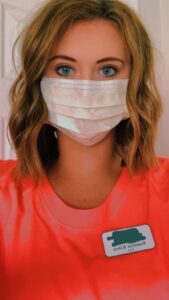
“I work on the front line of loneliness, anxiety, sadness and confusion,” said Saint Mary-of-the-Woods College (SMWC) sophomore nursing student Kamryn Kikta, from Brazil, Indiana.
Kikta, who works part-time as a Certified Nurse Aide (CNA) for Cloverleaf Healthcare in Knightsville, Indiana, says although she may not work directly with the COVID-19 pandemic, she sees its effects daily.
“To anyone working in a long-term care facility, it is important to remember that our residents need a smiling face and gentle hand now more than ever,” she said of the isolation that has impacted her work.
Kitka, who transitioned to online learning in March when the College moved campus-based classes to remote learning, believes that the crisis is definitely one for the history books. As a nursing student, she has taken the opportunity to learn about the transmission and progression of diseases, particularly COVID-19 and hopes that other students are doing the same.
During this time of uncertainty as the disease continues to spread throughout the Wabash Valley, Kikta is concerned for those who are most vulnerable.
“First and foremost, the care we provide residents has not necessarily changed rather has been heightened. Those of us working in facilities have definitely had to change “hats” to fit a role of caregiver, loved one and someone to release their frustrations. This difficult time has been very confusing to many residents as they greatly miss their loved ones,” added Kikta.
“Truthfully, I have been extremely worried and concerned regarding this difficult time. I have also struggled with the inability to attend regular Mass, as attending Mass has often been a safe haven. With that said, I have prayed a lot recently and feel as though God is a great source of strength during this time,” she said.
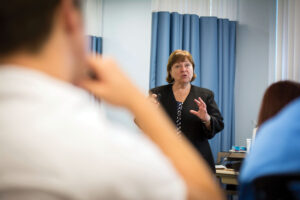
Marcia Miller, Ph.D., chair of the SMWC nursing department and professor of nursing, says that she cries a few moments every day. “The term “compassion fatigue” is a concept that is taught in several nursing courses along with the value of resilience,” said Miller.
According to Miller, more than 20 current students are working as patient care techs or LPNs in all areas of the health care system while juggling their classes and a number of recent Bachelor of Science in Nursing (BSN) graduates have stepped-up to be in the midst of this pandemic.
“One graduate in December was immediately crossed trained to work the special COVID-19 unit and is working six 12-hour shifts per week,” said Miller, who launched the College’s first ever nursing program in 2015 with an emphasis on holistic health and social justice which teaches students to become advocates for their patients as they are called to care.
“It is important to acknowledge one’s own emotions and stressors while pulling together to meet the needs of patients. We will stay strong now and will continue to stay together during the journey through the recovery from our own compassion fatigue,” explained Miller.
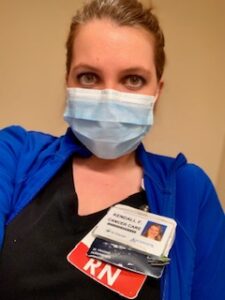
SMWC nursing alumna, Kendall Fry ’18, a registered nurse at Ascension St. Vincent Indianapolis, has had to be flexible in a busy and chaotic time with policies and procedures changing daily.
“In March we were given a couple hours of notice that we would be merging with other units in the hospital to make room for patients with the virus. Every day since then has been a whirlwind of changes,” said Fry, who is among the College’s first cohort of nurses to graduate from the BSN program. “Currently, all hospital staff taking direct care of patients are required to wear a mask at all times. We have now adopted measures to recycle masks from day to day in order to conserve on PPE. While the hospital and our leaders are doing their best to keep its essential workers safe and prepared, we can only take one day at a time right now.”
Fry’s unit, which was once surgical oncology, now takes patients who are COVID-19 negative and all others who cannot be placed in COVID-19 units as the hospital attempts to keep immune compromised patients separated from those with the disease.
“Honestly, the preparedness I feel in my career is not tied to this crisis. My education at SMWC is extremely valuable and prepared me to be the best registered nurse that I could possibly be,” said Fry, who added that she believes “no one could ever prepare fully for what we are going through right now.”
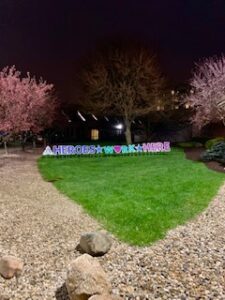
Although Fry does not consider herself a true front-line worker as compared to those working in COVID-19 units, the ICU and emergency departments, she acknowledges that all hospital staff are vital to keeping the healthcare system functioning and to keep people safe.
Fry said of her career, “I always thought being a nurse was a noble profession. Now more than ever is the time to be proud of what we do. Even though most days are hectic and challenging, at the end of the day I am proud of what I can offer to my patients, coworkers, state and country.
“In my 42 years of working in health care, I’ve never seen anything like this,” said Woods alumna Colleen North, a co-owner of Journey North Care Management, a geriatric care and advocate group in Columbus, Indiana. “Somedays, I want to cry, then I think, ‘You can’t, you’ve got to look forward.’”
North, who graduated from the Women’s External Degree Program (WED), now Woods Online, in 1992 in social work, said that prayer service with patients and families helps to fill a need during this uncertain time.
“Our faith is what’s going to get us through this,” North said of the crisis even as she worries about her clients being affected. “People have asked me why I don’t just walk away? I say that there is no one here for most of these people, and I can’t just abandon them. So, we move forward.”
North, who had not seen her own mother in over a month for fear of transmitting the disease, said that this time has been very trying physically and emotionally to her clients and families as well as she and her partner, who are alternating their work schedules to make sure that if one gets sick, the other can still serve their clients. “It’s surreal. What happens next? We just make the most of it.” North said.

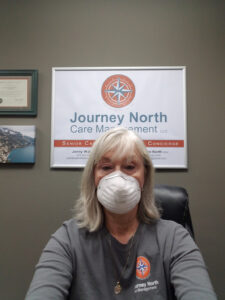
0 Comments